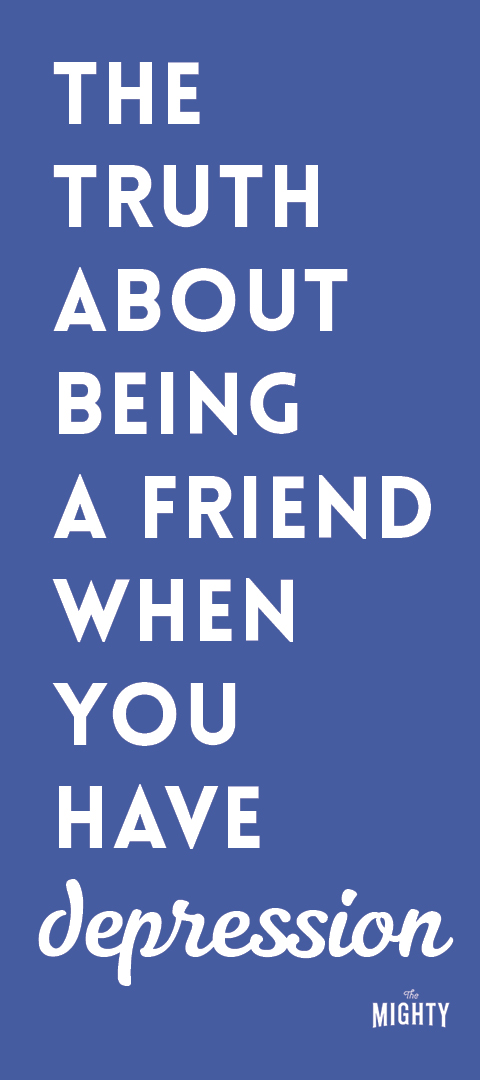Depression is sometimes described as a dark veil that covers your vision. When you’re in the thick of it, you see everything through this veil — yourself, your job, even your friends. That’s why it can be hard to maintain friendships when you’re living with “depression perspective.” Hanging out, texting back or reaching out can seem pointless. Or even if you did, who would you want hear from you anyway?
Of course, this isn’t true. True friends stick through hard times, and that includes periods of depression. But it can be hard to know what a friend with depression is thinking if they’re isolating themselves instead of reaching out. That’s why we asked people in our mental health community who have experienced depression what it’s like to be a friend during those dark times. If you have a friend who has depression, this might give you some insight into what’s going on in their heads.
Here’s what they told us:
“You always feel like you’re failing them. Not responding to calls and texts just because you don’t want to talk to anyone… You rarely reach out because you feel you have nothing to talk about except your crappy depression… It’s a constant guilt that you can’t control.” — Melissa R.
“It feels like you’re undeserving of their friendship. That you’re more of a taker and not enough of a giver. It feels as if you have nothing to add to the relationship and you’re constantly filled with guilt and shame, believing they deserve so much more. Believing they deserve a friend who is positive, happy, encouraging and invested in their life. Instead, they’re always being that friend for you.” — Brittany C.
“It’s like wanting someone to call then being too afraid to answer. It’s feeling like your mere existence is a burden. It’s feeling like if they really knew me they wouldn’t like me.” — Jennifer D.
“Isolation is easier. You don’t have to explain your struggle or feel like a burden, no fear of judgment because your feelings may seem pathetic or dramatic to people who don’t know what it’s like to live with the way you feel. Most people I try to reach out to just drift away before I can even get to know them.” — Rach P.
“For me, it’s contradictory. My close friends know they can talk to me about anything, no judgment, and I’ll be there to listen and help if I can. But I won’t open up the same way to them, because I don’t want them to have to burden what I’m going through.” — Erin B.
“I constantly feel like when my friends are talking I’m not listening. I have a hard time understanding their anger or even sadness, then other days I feel it on a different level. I have so many friends, but when we do things or go places I have a hard time connecting or talking about things.” — Amethyst C.
“It is so much guilt and shame. I feel bad for never being a part of their lives. I feel ashamed of it and that creates more guilt and anxiety which self-perpetuates. The times I do hang out I feel like I’m not even wanted around and need to be constantly validated as a friend which just continues the cycle.” — Ericka M.
“You learn to be a great actor. Because if you don’t act like your usual happy self while you’re with them, you feel incredibly guilty. So you just replicate what you’d normally react with, a laugh, a joke. Because it feels like no one wants to be friends with a depressed person” — Cheri Z.
“It’s being paranoid that they are always talking bad about you, that they don’t want you around and that you are the worst friend in the world, you feel like you’re drowning while everyone else around you is swimming.” — Ellie M.
“It’s being behind a closed door, alone. You hear a knock; it’s your friend, now it’s time to put your mask back on. Feeling ‘happiness.’” — Timmi P.
“People get the wrong idea and think that you don’t enjoy their company anymore. But reality is, you need their company more than ever, you just don’t want to bother them by being negative so you don’t make plans anymore.” — Shannon M.
“It’s wondering if they really like you and why. It’s feeling that you will always be the one left behind, and that you are a burden and a drain to them unless you act like a different person.” — Laura J.
“Being a friend with depression is constant disappointment. There are many days I cancel plans that we have previously made. So many days, that no one invites me anywhere anymore.” — Geri S.
“You just want them to be happy. Have all the happiness you don’t have. You feel undeserving of the happiness, but this person deserves it all and more. You would do anything to be sure that they don’t ever feel the same pain you do.” — Victoria C.


